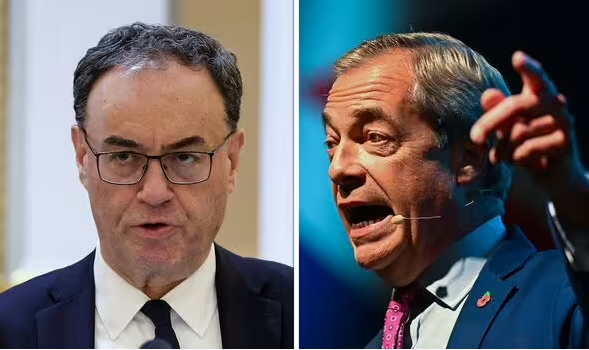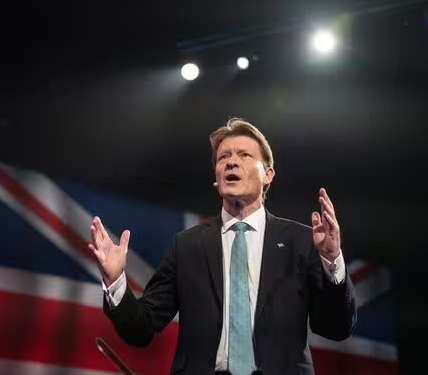Speaking last night, Andrew Bailey said he was duty bound to “point out the consequences” of the UK going it alone.
Nigel Farage has offered a withering analysis of Andrew Bailey after the Bank of England Governor advocated closer ties with the European Union – eight years after Brexit.
Mr Bailey offered his perspective yesterday during a speech at Mansion House in the presence of Chancellor Rachel Reeves.
Specifically, while insisting he took no position on the decision to quit the bloc in 2016, the UK should “welcome opportunities to rebuild relations while respecting the decision of the British people”.
Mr Farage, posting on X, was unimpressed, and highlighted remarks by Mr Bailey in April, when he admitted his surprise at a smaller-than-expected fall in inflation.
The Reform UK leader said: “The Governor of the Bank of England, the man who didn’t see inflation coming, wants closer ties to the EU.

Andrew Bailey, Governor of the Bank of England, and Nigel Farage, Reform UK’s leader (Image: GETTY)

Chancellor Rachel Reeves delivered her first Mansion House speech after Mr Bailey (Image: PA)
And in a four work blast said he Mr Bailey was part of “the same old failed establishment” who “are still in charge and the country gets poorer.”
During his speech, Mr Bailey said he was duty bound to “point out the consequences” of the UK going it alone.
He said: “The changing trading relationship with the EU has weighed on the level of potential supply.
“The impact on trade seems to be more in goods than services, that is not particularly surprising to my mind.
“The picture is now clouded by the impact of geopolitical shocks and the broader fragmentation of the world economy.”
Mr Bailey’s remarks are consistent with his previous observations on the subject since taking over from Mark Carney in 2020, after which has stated that the UK’s departure from the EU has reduced the economy’s openness and weakened trading opportunities.
Speaking at various forums, including the Central Bank of Ireland, Mr Bailey acknowledged that while the UK could establish new global trade relationships, this requires a strong commitment to free trade – a goal he says is essential for long-term economic stability has often maintained a neutral stance on Brexit
However, he has emphasised the tangible impacts of Brexit on the economy, such as disruptions to supply chains and reductions in trade, particularly in goods. He has also highlighted how the broader economic environment, including shocks like the COVID-19 pandemic and geopolitical tensions, has compounded these challenges.
The Bank of England chief has also suggested that businesses face ongoing hurdles, including reduced confidence and higher costs due to new trading barriers. His comments reflect the concerns of many economists that Brexit may hinder the UK’s potential growth unless mitigated by effective policy and investment in new trade opportunities.

